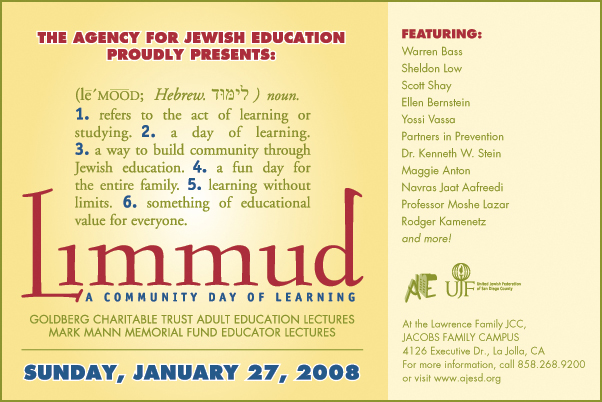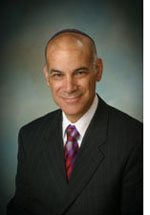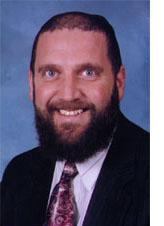

THE VIEW FROM JINSA
Just what did President Bush say in Israel?
 WASHINGTON, D.C.—President Bush said very little new on his visit to Israel and the Palestinian Authority (PA), with the exception of an interesting twist on a previously made point about Palestinian refugees. WASHINGTON, D.C.—President Bush said very little new on his visit to Israel and the Palestinian Authority (PA), with the exception of an interesting twist on a previously made point about Palestinian refugees.
As he has in the past, the President called for a Palestinian state ("long overdue"), adherence to the Road Map and Annapolis, institution building in the PA, Arab acceptance of the permanence of Israel, and he reiterated that no Palestinian State would be born in terror. He emphasized that the 1949 armistice line would not be a border - peace "will require mutually agreed adjustments" - and reaffirmed not only his, but also America's commitment to Israel's security. He reaffirmed too the necessity of the PA "confronting terrorists and dismantling terrorist infrastructure," but
Shoshana Bryen
skipped over the Palestinian civil war. He called for "ending settlement expansion and removing unauthorized outposts," both previously expressed positions. (He did not call settlements "obstacles to peace" or call for their removal.) He mentioned Jerusalem, but offered no prescription, simply noting, "finding a solution to this issue will be one of the most difficult challenges on the road to peace, but that is the road we have chosen to walk."
So it wasn't exactly what he said that was slightly disconcerting, it was having him say all of those things in the space of a few hours, and say some of the difficult ones standing by a smiling Abu Mazen.
Mr. Bush did open the door to a pet issues of ours when he said, "I believe we need to look to the establishment of a Palestinian state and new international mechanisms, including compensation, to resolve the refugee issue." (Nixing the so-called "right of return.") A new "international mechanism" may be a way to rid the Palestinians of the yoke of UNRWA, the UN Agency that has perpetuated the misery of Palestinian refugees from generation to generation by preventing their resettlement. UNRWA rules about "temporary camps" created much of the poverty the world has come to associate with Palestinians and UNRWA rules created the extra-territorial pockets in Lebanon that sheltered international terrorists and, last summer, Fatah al-Islam. Both Hamas and Fatah have used UNRWA facilities in the PA territories to shelter terrorists as well.
We repeat our suggestion that Palestinian refugees be moved from the UNRWA mandate to the UNHCR mandate, which is to resettle refugees in countries that agree to have them. Move the money with them. Add "compensation" money. Give Palestinians a real understanding that Israel is permanent and legitimate and there is no wholesale "right of return." Then give them a real choice about how to proceed with their future - by going to the new Palestinian state, or by going elsewhere.
We are deeply skeptical about the potential for success in presidential diplomacy in the last year of a term, and we believe the divided Palestinian Authority cannot and will not make a secure and durable peace with Israel (even a unitary PA under Arafat couldn't and didn't). But we do believe the President means to move the process forward. Helping Palestinians toward accommodation with reality through resettlement and financial compensation would remove an impediment to future peacemaking and help cement the President's legacy as a friend of both Palestinians and the State of Israel.

LETTER FROM JERUSALEM
Is Olmert only play-acting for Bush?
By Ira Sharkansky
 JERUSALEM—I am ambivalent about writing this column JERUSALEM—I am ambivalent about writing this column
One reason is that I might be wrong.
Another reason is that, whether I am right or wrong, or even partly right, what follows may add to the reputation of Jews as being slippery and somewhat deceitful.
Ira Sharkansky
Part of me says that is all right. Jewish history has taught us to use our brains to avoid trouble. Israel's condition is not enviable. Our enemies are vicious. By comparison, slippery and deceitful are admirable qualities.
My purpose is to explain, to myself and others, what is happening in the peace process.
On the one hand, the American administration is putting its considerable prestige behind a push aimed at Israeli and Palestinian officials to meet continuously toward resolving disputes of considerable difficulty: the final borders of each state; the defense of Israel; the fate of Israelis living on land to be assigned to Palestine; and the resolution of the problems associated with Palestinians who left their homes 60 years ago. Some would add other issues to this list, but these are complicated enough to carry the burden of this note.
The man who carries the title of President of the Palestine National Authority, Mahmoud Abbas, has nominal control over the West Bank. His record when in nominal control of Gaza, or now the West Bank, in order to improve the lives of Palestinians or to assure Israeli safety is open to serious question. Publicly, he adheres to non-negotiable positions with respect to Palestinian refugees, the borders of the Palestinian state, and its capital in Jerusalem. Each of these is counter what is acceptable to large or small majorities of Israelis, depending on the issue.
Israel's prime minister, Ehud Olmert, expresses his commitment to ongoing negotiations, but also cautions against excessive optimism. He has coupled security from Gaza along with security from the West Bank as conditions of significant Israeli concessions. Insofar as the Hamas rulers of Gaza are dead set against any concessions, the combination of Abbas' and Olmert's postures seem to assure that the peace process will produce nothing but frustration.
What is really happening?
My own guess is that both sides are playing a game, or engaged in what commentators call "virtual negotiations." Read that as something like a computer game. President George W. Bush demands serious efforts, and the position of the United States is such that President Bush will get serious efforts.
The danger is that frustration will produce another uptick in Palestinian violence. Israeli have lived through lots of these since the early part of the 20th century, and the security forces have learned to cope. Currently the Israeli casualties due to Palestinian violence are about 3 percent of the casualties due to road accidents. The Palestinians in Gaza and the West Bank lose more of their people killed, injured, and put in Israeli prisons on a weekly basis than Israelis lose in a year.
The number of Israeli casualties is not the whole story. Currently the Israelis who live near Gaza are paying an especially heavy price due to rockets and mortars fired against them on a daily basis. This is intolerable, but perhaps inevitable. To stop this for more than a short time Israel would have to risk a much higher casualties rate than at present among its soldiers, and kill so many Palestinians as to risk international censure.
Like it or not, Israel lives on a knife edge of international tolerance, similar to the historic problem of Jews throughout the Diaspora.
This is not a happy conclusion, but in comparative terms it looks better than at first glance. As Israel approaches its 60 birthday as an independent country, it enjoys a World Bank ranking among the richest countries. Israelis do better than Americans on measures of health and longevity. Its social services could be better, and it could invest more in its economic future, if it did not have to spend so much of its resources on national defense, and if so many of its young people did not have to spend so much of their time as soldiers. Compared to American efforts in Iraq and Afghanistan, the recent military accomplishments of Israel look pretty good.
Perhaps a bit of play acting on the part of our prime minister is one of the requirements for keeping on the good side of the United States and other great powers. Some of us might aspire to greater heroism and more overt honesty. We should remember, however, that one of the secrets of political success is going along in order to get along. Politics is not for simpletons. Israeli politics may be more demanding than most. Too much heroism, and too much honesty would be out of place.

TORAH ON ONE FOOT
Mitzvot easier done than other obligations
By Rabbi Leonard Rosenthal
 SAN DIEGO—A number of years ago Judy and I heard renown thinker and author, Rabbi Joseph Telushkin, speak at a U.J.F. Young Leadership event in Washington, D.C. Rabbi Telushkin told us that he constantly watches his weight and it is often a losing battle. However, despite his love of food he has never been tempted to eat treif. He shared with us the reason avoiding overeating was such a problem but that eating non-Kosher food was not: the former was a matter of personal self control, the later was a mitzvah, God’s commandment. Rabbi Telushkin struggled with his own yetzer hara (evil inclination) but he had little problem heeding the will of God. SAN DIEGO—A number of years ago Judy and I heard renown thinker and author, Rabbi Joseph Telushkin, speak at a U.J.F. Young Leadership event in Washington, D.C. Rabbi Telushkin told us that he constantly watches his weight and it is often a losing battle. However, despite his love of food he has never been tempted to eat treif. He shared with us the reason avoiding overeating was such a problem but that eating non-Kosher food was not: the former was a matter of personal self control, the later was a mitzvah, God’s commandment. Rabbi Telushkin struggled with his own yetzer hara (evil inclination) but he had little problem heeding the will of God.
In this week’s parasha we read about the Israelites’ Exodus from Egypt. Before they offered the Passover sacrifice they were instructed to remove
Rabbi Leonard Rosenthal
all chametz (fermented grain products) from their homes. In ordaining the subsequent yearly Passover celebration the Torah commands: "Throughout the seven days no unleavened bread shall be eaten; no leavened bread shall be found with you, and no leaven shall be found in all your territory." (Ex. 13:7) Each year before Pesach Jews remove all chametz from their homes. Not only are we not allowed to eat it, we may not even own it. We dispose of it or temporarily sell it to a non Jew.
Many years ago Rabbi Levi Yitzchak of Berditchev and a member of his congregation were taking a walk on the morning before Passover when they were approached by one of the Czar’s tax collectors. The tax collector asked them: "Do you have anything in your homes you purchased outside the country for which you have not paid duty? Rabbi Yitzchak’s congregant answered: "Yes, I do. Please come home with me and I will pay my taxes." The two of them took their leave of Rabbi Levi Yitzchak.
Continuing his stroll, Rabbi Levi Yitzchak came upon a Jewish townsperson who was also walking in the street. Rabbi Levi Yitzchak asked him: "Do you have any chametz in your home?" The man was taken aback. "Of course I do not," he said. "Pesach begins tonight and it is already late in the day!"
Rabbi Levi Yitzchak kept on walking until he met another Jew. He asked him the same question: "Do you have any chametz in your home?" The second man was also surprised. "Pesach is almost upon us," he said. "It is forbidden to have chametz in our homes!"
Rabbi Levi Yitzchak lifted his eyes heavenwards and said: "Master of the Universe! Look down from your heavenly abode upon your people, Israel. See how they observe and adhere to your mitzvot!
"The Russian Czar is a very powerful ruler. He employs many officials, guards, and soldiers throughout his realm to insure that the people faithfully obey his laws and pay their taxes. Nevertheless, many of the Czar’s citizens disobey him and shirk their responsibilities.
"But You, Master of the Universe, who wrote in your Torah: "... no leavened bread shall be found with you . . . " do not have earthy officials, guards, or army to enforce Your Will, yet on the morning of Pesach every Jew obeys your commandment and has removed all chametz from their homes." (Parparot L’Torah, Shemot, p.51)
Mitzvah is often translated as "good deed" whereas its literal meaning is "Divine Commandment." Jews who think of performing mitzvot as responding to God’s will are much more likely to follow them than Jews who think that mitzvot are cultural artifacts or just nice things to do.
I pray that we may all learn to find God’s Presence and follow God’s mitzvot in all that we do, the better to bring holiness into our daily lives and into our world.


AMAZING STORIES OF JUDAISM
How our shortcomings can unite us
By Rabbi Baruch Lederman
 SAN DIEGO—After eating food we say the bracha (blessing) known as Boreh Nefashos. In it, we thank Hashem for creating us and our shortcomings (chesronon). Why do we thank Hashem for SAN DIEGO—After eating food we say the bracha (blessing) known as Boreh Nefashos. In it, we thank Hashem for creating us and our shortcomings (chesronon). Why do we thank Hashem for
our shortcomings? The fact that different people have different shortcomings is what makes the world go round. The baker has bread but he needs shoes so he goes to the shoemaker. The shoemaker needs cabinets so he goes to the carpenter. The carpenter needs medicine so he goes to the doctor. The doctor needs bread so he goes to the baker. Each of us can help others and get helped by others. This works in many ways on many levels as the following story from Roger Dean Kiser illustrates:
There once was a little boy who was raised in an orphanage. He always wished that he could fly like a bird. It was very difficult for him to
Rabbi Baruch Lederman
understand why he could not fly. There were birds at the zoo that were much bigger than he, and they could fly. "Why can't I?" he thought. "Is there something wrong with me?" he wondered.
There was another little boy who lived in town. He was crippled. He had always wished that he could walk and run like other little boys and girls. "Why can't I be like them?" he thought.
One day the little orphan boy, who had wanted to fly like a bird, ran away from the orphanage. He came upon a park where he saw the little boy, who could not walk or run, playing in the sandbox.
He ran over to the little boy and asked him if he had ever wanted to fly like a bird.
"No," said the little boy who could not walk or run. "But I have wondered what it would be like to walk and run like other boys and girls."
"That is very sad," said the little boy who wanted to fly. "Do you think we could be friends?" he said to the little boy in the sandbox.
"Sure," said the little boy.
The two little boys played for hours. They made sand castles and made really funny sounds with their mouths. Sounds which made them laugh real hard. Then the little boy's father came with a wheelchair to pick up his son. The little boy who had always wanted to fly ran over to the boy's father and whispered something into his ear.
"That would be OK," said the man.
The little boy who had always wanted to fly like a bird ran over to his new friend and said, "You are my only friend and I wish that there was something that I could do to make you walk and run like other little boys and girls. But I can't. But there is something that I can do for you."
The little orphan boy turned around and told his new friend to slide up onto his back. He then began to run across the grass. Faster and faster he ran, carrying the little crippled boy
on his back. Faster and harder he ran across the park. Harder and harder he made his legs travel. Soon the wind just whistled across the two little boys' faces.
The little boy's father cried with joy as he watched his beautiful son flapping his arms up and down in the wind, all the while yelling at the top of his voice,
I'm flying, daddy. I'm flying
Dedicated by Yossi & Rebecca Kaplan in memory of his grandfather Asher Zelig ben Mordechai HaLevi.




SAN DIEGO JEWISH WORLD THE WEEK IN REVIEW
Judy Lash Balint in Jerusalem: Bush security proved a tourist attractionBruce Kesler in Encinitas, California: Gandhi's grandson blames Jews for 'culture of violence' in the Middle EastIra Sharkansky in Jerusalem: Baroque music lovers brave Bush security
Judy Lash Balint in Jerusalem: Bush shuts down Jerusalem traffic
Shoshana Bryen in Washington, D.C.: Bush must make case for Iraq to Arabs
Donald H. Harrison in San Diego: He'll whup you but not until after sundown
Ira Sharkansky in Jerusalem: Olmerts 'illegal settlement' problem
Shoshana BryenDonald H. Harrison Charly Jaffe in San Diego: We worry if we will be accepted to a good college;
they worry if they'll be alive through high school
Shoshana Bryen in Washington, D.C.: A briefing for President George W. Bush
Donald H. Harrison in San Diego: Documentary enlarges upon the work of New Zealand photographer Friedlander
Sheila Orysiek in San Diego: Paroxysm - the National Election Begins
Ira Sharkansky in Jerusalem: Pay no heed to ' junk' on the internet
< BACK TO TOP
|

